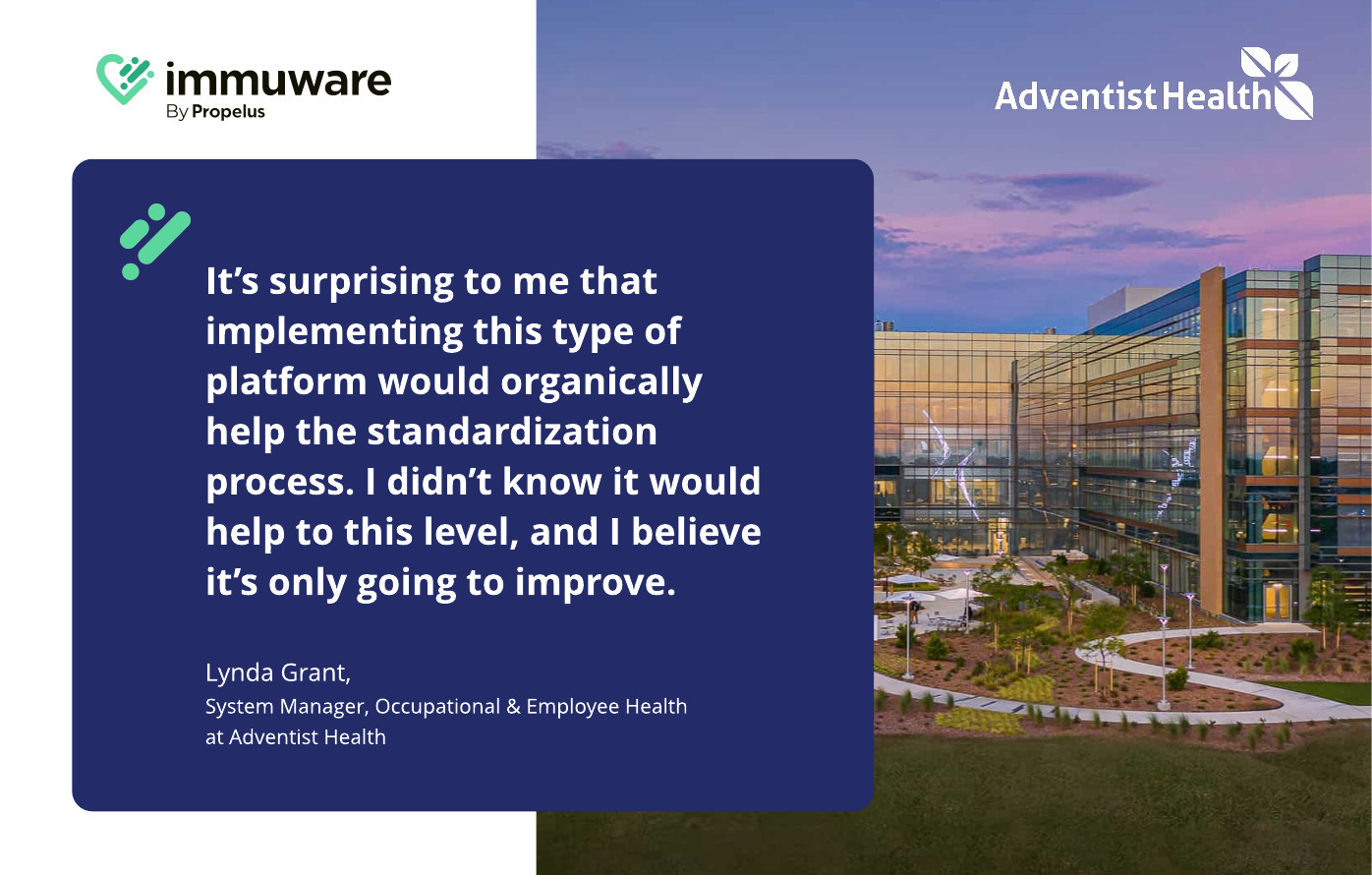Overview
Adventist Health, a prominent healthcare organization serving communities in California, Oregon, and Hawaii, embarked on a path of continuous improvement by adopting innovative employee health software. This initiative effectively surpassed the constraints of existing processes and systems, setting a new standard in employee health data management for the organization.
Challenge
Adventist Health had an established process for managing employee health data across the organization. Nonetheless, the existing systems were isolated, prompting the organization to identify an opportunity for improvement by improving collaboration and centralizing processes and systems. Despite initial challenges, including time-consuming tasks with spreadsheets and manual data entry, the commitment to improvement provided a chance to rejuvenate and modernize the approach. Additionally, addressing challenges in monitoring shared service employees became an exciting prospect for optimizing operational synergy among various facilities. This proactive stance positioned Adventist Health on the path to transformative change and innovation in employee health data management.
“We had an electronic employee health software through another company in eighteen different facilities, but they were in silos. Even though they were electronic, we still had to extract the data out of there and put it in another spreadsheet. We needed to be able to have an enterprise platform so we could see and track what all markets were doing.” Lynda Grant, System Manager, Occupational & Employee Health at Adventist Health, recalled. “The only way to succeed and standardize was to have an enterprise platform.”
Solution
Adventist Health assembled a dedicated group of stakeholders to delineate essential capabilities for a new solution in a proactive pursuit of standardization within the organization. “We formed a group of stakeholders and identified ‘what do we want in the system’ and ‘what does it need to have?’ Then, this group of stakeholders interviewed each platform,” Grant explained. After evaluating several platforms with key stakeholders in the organization, they chose Immuware for its user-friendliness and efficient reporting features. The system allowed for easy navigation with fewer clicks and was mobile-friendly, offering a dashboard that facilitated easy tracking of various metrics. “Immuware allowed me and other stakeholders access to the product before buying it. That was important to me. Also, there were fewer clicks to get what we wanted, the reporting feature was understood, and we could easily extract the information needed. You could also view the data easily on a mobile device.” Grant said.
Implementing Immuware brought several innovations, including telehealth-based occupational assessments and significantly reducing onboarding time. The system also facilitated streamlining processes such as flu vaccinations, with teams able to track the progress through a dashboard.
Immuware has also enabled the integration of a feature that allowed new hires to attest to their ability to perform the job’s functional demands, simplifying the occupational assessment process. “The system is really innovative for us, and I think it’s going to solve the issues and delays we’ve previously had,” Grant said. “With Immuware, we built an attestation so the new hire can go in, and we can assign a job code to and connect a list of functional demands. It will get sent to the new hire; they read it and know what the functional demands of the job are, and attest they can do the job’s essential functions with or without accommodation, and they must include what the accommodation is. This alerts Employee Health that an interactive conversation must occur before clearing them to work.”
Results at Adventist Health
Implementing Immuware has instilled confidence in the team, helping them move from a fragmented system to a more streamlined and efficient process. The platform has aided in achieving higher compliance rates, with markets moving from 50% accuracy to 100% in some cases. “Even if they were more compliant [prior to Immuware], the record-keeping wasn’t the same. Now, it’s perfected and helped transition tests. The more I think about it, the more processes we’ve standardized through Immuware, and I could never have done them on my own,” Grant said. The system has also played a pivotal role in preparing for surveys and inspections by regulatory bodies, helping maintain readiness at all times by ensuring easy access to necessary records. “I think it’s more streamlined because our teams were already organized, but when it comes to surveyors, what has really helped us is tracking old records.”
About Adventist Health
Adventist Health is a faith-based, nonprofit, integrated health system serving more than 90 communities on the West Coast and Hawaii with over 400 sites of care. Founded on Adventist heritage and values, Adventist Health provides care in hospitals, clinics, home care agencies, hospice agencies, and joint-venture retirement centers in both rural and urban communities.
Their compassionate and talented team of 37,000 includes employees, physicians, allied health professionals, and volunteers driven in pursuit of one mission: living God’s love by inspiring health, wholeness, and hope. They are committed to staying true to our heritage by providing patient-centered, quality care. Together, they are transforming the healthcare experience with an innovative and whole-person focus on physical, mental, spiritual, and social healing to support community well-being.
